I have been living in Istanbul for four years. Just writing that sentence makes me dizzy.
As a Spanish expat living in this amazing city, I’ve had to learn how to deal with a different culture full of distinctive customs and habits. Some of them I embraced fairly easily. But there are others that, while I don’t have any other choice than to live with them, I still struggle to get used to. This has to do with the simple fact that I am a foreigner living in a culture I didn’t grow up in, as has been explored by my fellow Yabangee contributor Missy Weimer. Some of it may also relate to the more specific situation of a guy from Barcelona living in Istanbul. So without further ado, and in the hopes that some of you may relate, I’ve listed the ten things I’ve gotten used to and the ten things I haven’t gotten used to about living in Istanbul:
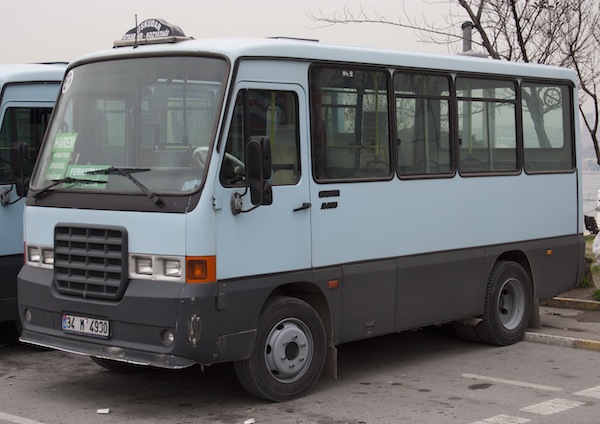
What have I gotten used to?
Etiquette and protocol. Spain is a society with a fairly relaxed approach to protocol. You would almost never address your boss as ‘sir’ or speak to an elder in a formal style (“usted” in Spanish or “siz” in Turkish). In Istanbul I have observed coworkers use the –siz ending and bey/hanım when addressing their bosses even after years of acquaintance. Also, we Spaniards lack special phrases for certain situations, like when you just got your hair cut (sıhhatler olsun), when you see a baby (maşallah!) or to thank your host for cooking (ellerinize sağlık). While some of these pleasantries feel a bit anachronistic to me, they do so in a way that makes me chuckle, and I have come to respect them. I enjoy that even my most rebellious and anti-authority friends pay respect to their elders (and visit or call them to celebrate bayram)
Informal public transportation. A commute in Istanbul is a pretty unique experience. Crossing the Bosphorus bridge at 2 am in a dolmuş, the classic shared taxi, provides an adrenaline rush that I imagine is similar to the one you get when driving a Formula One car. Then we have the minibus drivers, experts in squeezing in impossible spots to overtake other drivers while going at what feels like the speed of light. And finally there are the ferries. It feels like a once-in-a-lifetime experience every time you criss-cross from Asia to Europe. In fact, there is nothing more breathtaking than watching a sunset from a boat crossing the Bosphorus. How could one not immediately get used to a sight as beautiful as this?
The Turkish sense of humor. I find that Turks have a special ability to make fun of hard or sad situations with a very particular mix of sarcasm and resignation. And it’s very contagious. Every time someone describes a bad experience they are able to distill humor from it. Like if there is yet another surreal piece of political news, hundreds of memes are immediately born. The down side of this kind of humor? The commonly heard sentence, ‘yapacak bir şey yok’ (there’s nothing to be done).
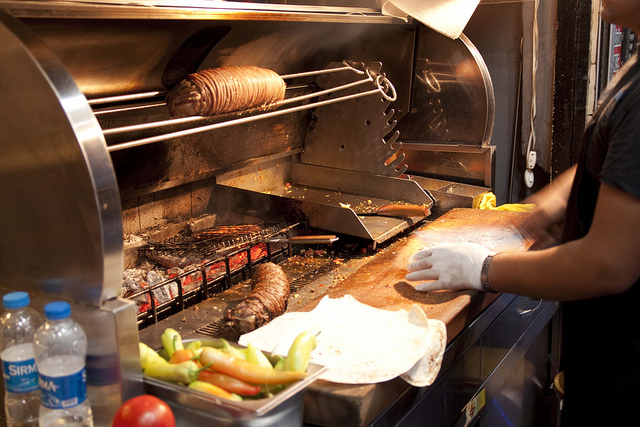
Food. Once you go past the döner kebab, you discover a diverse (and delicious) food culture. Being used to the Mediterranean diet, it was very easy for me to embrace the excellent homemade food of this country. The rich “mummy food” of Turkey is absolutely delicious and, in my opinion, it’s extensive menu easily beats many other countries in regard to diversity. I still disagree with Turkish mothers that a dinner based on yummy but greasy food, accompanied by yogurt sauce, can be considered sağlık (healthy), but I’ll eat it any time.
Street food. I give street food a different section because it deserves all my praise. I am convinced that you can take the pulse of a city by looking at the amount and diversity of street food on offer and how late you can get it. In Barcelona, street food is limited – curiously enough, a lot of kebab places are run by Indians – and these places usually close long before midnight. In Istanbul there are tons of different types of street food – kokoreç, midye dolma, ıslak hamburger, etc. – and they are available 24/7. You’ll never go hungry in Istanbul, and you will never return home with an empty stomach after a night of partying.
Çay. Without tea, Turkish society would collapse. Having Italian blood in me, coffee is and always will be my first choice in the morning. But around a group of friends it’s impossible not to love the ince belli cups – the classic “slender waist” tea cups – and drink round after round of black tea. More than the tea itself, it’s the communal experience of sharing this drink (similar to how mate is drunk in Argentina) with the sound of the boiling çaydanlık and metal spoons clinking against the glasses that creates this magical bond.

Hospitality. In Spain people won’t usually go out of their way to help you on the street, and it’s rare for a stranger to start a conversation with you. So at first I was suspicious of shop owners offering me tea, and strangers starting random conversations or offering me help when I was lost. After a while I discovered and loved that most Turks are extremely helpful and hospitable and will invite you and receive you at their home with çay, food and a long conversation.
The ritual of breakfast. I am not talking about the delicious food (oh, celestial bal kaymak) or the enormous amounts of it but about the ritual itself. Kahvaltı is not just a meal of leisure, but also an experience in cultural belonging. The Turks I know seem to have a near-religious devotion to breakfast, mainly because it’s the perfect excuse to catch up with friends and family while surrounded by a feast fit for the gods. As I have written before, friends invite you over for breakfast, not dinner. To me, this communal experience shows just how much Turks enjoy sharing time together.
Snow. I’ve only ever seen snow twice in Barcelona, so every year the week or so that it snows in Istanbul is just awesome. You can have snowball fights and slide down the hills like a child.
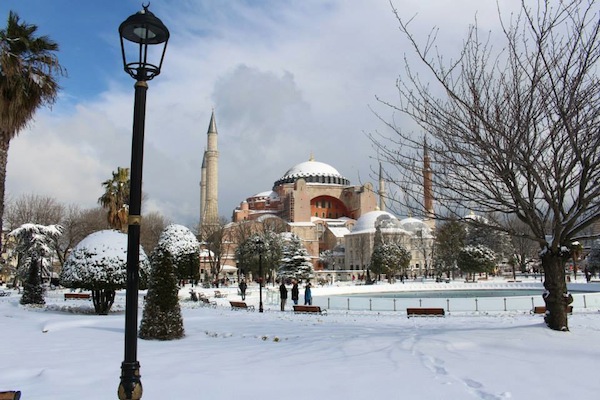
Türkçe. I spoke four languages before arriving here, and I honestly thought I would never learn Turkish. I was stuck for two painful years in what I call the “Nasılsın? İyiyim” zone. I can’t say that I’ve mastered the language – very far from it – but now at least I can understand the general topics of a conversation and even participate if I don’t shy away. I definitely feel more integrated now that I’ve gotten used to – and even begun to love – this peculiar language.
What I still haven’t gotten used to.
Sour foods. The love here for turşu (pickles of all kinds), şalgam suyu (pickled turnip juice) and erik (unripe plums) still makes no sense to me. Let’s just admit it: doesn’t putting salt on a piece of fruit defeat the purpose?
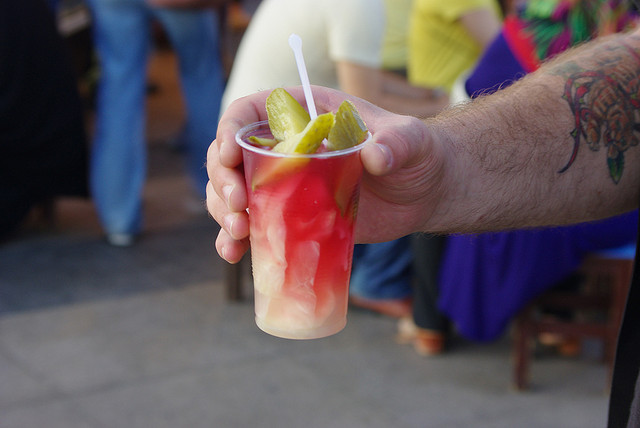
Rudeness while commuting. I’ve found this to be in direct contradiction with the hospitality and kindness displayed by Turks at home. The street is a jungle in Istanbul. Yes, I get that there are over 14 million people packed in the city, but that’s not really an excuse for bad behavior. The respect for cues is relative. It’s like there’s a Black Friday sale whenever you get on the ferry or bus. And what about the people who get on the metro before letting everyone get off? That enrages me the most.
Traffic. It’s the Istanbul classic, and it sucks just as much as everyone says it does.
No pork. For a Spaniard, this is a hard one, a very hard one. While I don’t share them, I respect the religious beliefs behind the decision not to eat pork. I am also aware that if you grow up without this delicious animal meat available, the taste might be strong the first time you go abroad and try it. Yes, I can find prosciutto in Carrefour (although it’s terribly expensive) and in a very limited number of breakfast spots and pizzerias. But coming from a place where we use every bit of the pig, it’s hard not having pork readily available.
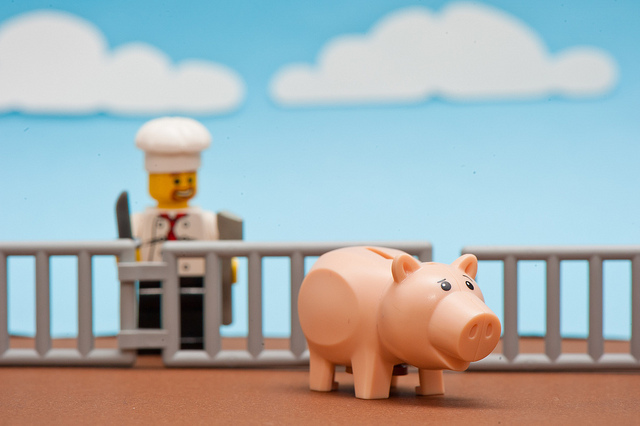
No beach. When I’m surrounded by so much water, all I want to do is jump directly into the sea. However, in Istanbul you have to make the effort and plan a trip to Şile, Ağva, Kilyos or the Princes Islands for a swim. While in Barcelona the nice beaches are outside of the city, it’s perfectly easy to go to the city beach during the day and have a refreshing swim.
Work-life balance. I don’t want to generalize, and I am aware that it mostly depends on the profession and sector you work in, but from my perspective (and granted, I am coming from Spain) it seems like employers here expect you to live to work rather than work to live. Working extra hours, Saturdays, no holidays in the first year of your job, and having only a week of holiday in one year is just ridiculous. But I guess… yapacak bir şey yok.
Politics. I can’t say that we are free of indecent politics in Spain, but I am always amazed (and not in a good way) at the corrupt actions that are undertaken in broad daylight here.
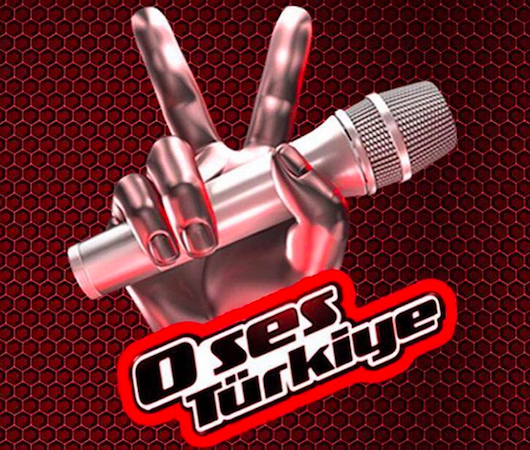
Turkish TV. It’s just not for me. A majority of the programming seems to be based on reality shows from other countries – O Ses Türkiye, Survivor – and the newscasts repeat the same video over and over again.
No recycling. Yes, I am aware that there are individuals who collect the recycling. Yes, I know there are certain days where in some neighborhoods the belediye picks up the bottles and papers. And yes, I’ve seen those ridiculously tiny green recycling bins. What I can’t seem to get used to is that there is no culture of recycling in this country. I feel disheartened every day when I see all the plastic bags that are being used or the many cigarettes and plastic bottles being thrown out of cars.
Turkish toilet. Without entering into a debate of whether it is more hygienic, easier to clean or more ergonomic as compared to sitting toilets, this might be the one thing that my habits from childhood (they are ingrained sometimes, right?) won’t let me get used to.
What have you gotten used to about living in Turkey? What can you not seem to get used to?








You just made my day 🙂 I was born and raised in Istanbul -still living here- but spent a year in Barcelona. Things you’ve mentioned were quite vice versa with me. Not being able to find street food options or open restaurants after a night club session or having just a “cafe con leche” for breakfast were sooo hard for me to get used to. My main chat topics when I was hanging out with friends were Turkish food, huge selection of night snacks or enormous breakfasts. They were sick of all that food talk! And the first thing that I reached when I went into a grocery store were tea bags, since it was impossible to find proper “demli çay”. I sometimes went to Turkish restaurants just to drink Turkish tea… On the other hand, it was great finding metro stations everywhere, enjoying my over-the-earth rides without regular horrible traffic jams, spending the day on the beach… Priceless. Can’t say the same about the snow though, I was really happy when I moved to BCN, assuming that I won’t have to deal with cold weather and snow -which I hate!- but well… Apparently I wasn’t that lucky. It snowed on my birthday. (March of 2010, damn.)
Ah, I also hate erik and strongly believe that sour fruits are nonsense, you got me there too. Can’t agree with you on turşu though 🙂
Anyway… Good luck with the things that you still couldn’t get used to, I’m sure you’ll be OK with them in no time. You’ve done great with dolmuş and minibüs, the hardest part is over 😉
Cheers!
Really great list it’s brought back mostly happy memories. I too was freaked out by the invites to strangers homes at first!
I could never get used to the crazy bureaucracy, I used to work for a gov uni and even I had major issues getting the right paperwork! Each office either not having a clue about rules or not taking responsibility, absolute chaos but despite that very warm people everywhere
I’m an American who’s lived in Istanbul for 3 years and is headed in 5 days to live in Barcelona. This is a delightful post, and shows a deep fondness for your adopted city. For us, the negatives have outweighed the positives, but I share a lot of both of yours. That said, I can’t wait for the pork, and the chocolate, and the coffee — yes even in the land of Turkish coffee, I prefer Spain’s. I’m glad to hear that the politics here are out of the ballpark for a Spaniard. That means we won’t be thinking we jumped from crazy into insane! I will miss the snow.
I agree with most of these! Especially the positives. However, I cant get used to the following
1. misogyny, unless you are a mother, then you are a saint
2. macho guys (esp. jealousy in relationships is considered a good thing)
3. kids being up all night, taken to restaurants until wee hours where people smoke and stuff, at the same time grown up kids living with parents, treated like babies
One of the things I love that is not mentioned – tolerance to different lifestyles (as long as it doesnt involve anyone from their family :))) )
I’m okey with most of these. But as an American, the peanut butter is HORRIBLE!!! That’s what I ask friends to bring me.
As a Dutch guy, having lived in Barcelona, you covered everything!
and… Viva Bicing!
[…] Try to get used to the things that may be unusual for us. When in Rome […]